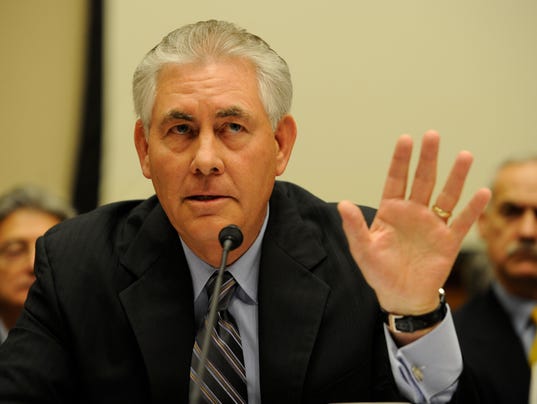
While fracking -- hydraulic fracturing of rock to release pockets of oil -- has raised complaints from environmentalists around the country, Chairman and CEO Rex Tillerson's opposition to a project in his own neighborhood is interesting, given how deeply Exxon Mobil is involved in the process.
Exxon Mobil CEO: No fracking near my backyard
Small quake in S.C. felt hundreds of miles away
A 4.1 magnitude earthquake struck South Carolina on Friday night, jolting residents in the Midlands and in two other states.
The U.S. Geological Survey says the quake hit at 10:23 p.m. about seven miles west-northwest of Edgefield, S.C. It occurred three miles underground.
Thousands of people reported feeling a heavy shaking for several seconds. The tremor was felt across South Carolina, and as far away as downtown Atlanta and Greensboro, N.C.
William Rivers Pitt :The Poisoner's Reckoning
 What you may already know: Freedom Industries, a coal-industry surrogate in West Virginia, dumped poison into the water supply known as the Elk River, waited 24 hours to tell anyone about it, waited even longer to mention that they had also dumped a second poison into the water supply, and then declared bankruptcy so as to make themselves judgment-proof in civil court against the hundreds of thousands of people who couldn't eat or work or bathe or cook for weeks...and this was all before the stuff they dumped into the river evaporated into formaldehyde, which it does, so everyone who couldn't eat or bathe or cook for weeks was suddenly eating and cooking and bathing in a whole different poison, this one being a known carcinogen...but they're bankrupt now, so screw you and your tumors.
What you may already know: Freedom Industries, a coal-industry surrogate in West Virginia, dumped poison into the water supply known as the Elk River, waited 24 hours to tell anyone about it, waited even longer to mention that they had also dumped a second poison into the water supply, and then declared bankruptcy so as to make themselves judgment-proof in civil court against the hundreds of thousands of people who couldn't eat or work or bathe or cook for weeks...and this was all before the stuff they dumped into the river evaporated into formaldehyde, which it does, so everyone who couldn't eat or bathe or cook for weeks was suddenly eating and cooking and bathing in a whole different poison, this one being a known carcinogen...but they're bankrupt now, so screw you and your tumors.
What you may not yet know, but need to: Gary Southern, President of Freedom Industries, gave a press conference the day after the spill was announced, and did yeoman's work to ensure himself a first-ballot nomination into the Bastard's Hall Of Fame.
Donald Trump loses legal challenge to windfarm near his Scottish golf resort
 Donald Trump has lost a legal action against a major experimental windfarm being built close to his golf resort in Aberdeenshire.
Donald Trump has lost a legal action against a major experimental windfarm being built close to his golf resort in Aberdeenshire.
The billionaire property developer had alleged that Alex Salmond, Scotland's first minister, had secretly interfered in the decision to approve the 11-turbine European offshore wind deployment centre site (EOWDC) in Aberdeen Bay – a claim rejected on Tuesday by a Scottish civil court judge, Lord Doherty.
Oil firms may get secret cleanup payments
 A pioneer in cleaning up toxic messes, Thomas Schruben long suspected major oil companies of being paid twice for dealing with leaks from underground fuel storage tanks - once from government funds and again, secretly, from insurance companies.
A pioneer in cleaning up toxic messes, Thomas Schruben long suspected major oil companies of being paid twice for dealing with leaks from underground fuel storage tanks - once from government funds and again, secretly, from insurance companies.
Schruben, a detail-oriented Maryland environmental engineer who helped draft government pollution rules going back 30 years, looked for a lawyer to help ferret out what he believed could in some cases be fraud. He found a partner in Dennis Pantazis, a buoyant, mustachioed son of Greek immigrants in Alabama known for bringing environmental and civil rights cases.
"Together we started unraveling the mystery," Schruben said.
Evidence 'suggests climate change link to UK storms'
 Climate change is likely to be a factor in the extreme weather that has hit much of the UK in recent months, the Met Office's chief scientist has said.
Climate change is likely to be a factor in the extreme weather that has hit much of the UK in recent months, the Met Office's chief scientist has said.
Dame Julia Slingo said the variable UK climate meant there was "no definitive answer" to what caused the storms. "But all the evidence suggests there is a link to climate change," she added.
"There is no evidence to counter the basic premise that a warmer world will lead to more intense daily and hourly rain events."
Oil, Gas Drilling Seems To Make The Earth Slip And Go Boom
 There's been a surge in earthquakes in the U.S. over the last few years. In Texas, there are 10 times the number of earthquakes now than just a few years ago.
There's been a surge in earthquakes in the U.S. over the last few years. In Texas, there are 10 times the number of earthquakes now than just a few years ago.
Scientists say it's likely linked to the boom in oil and gas activity, meaning that people who never felt the ground shake are starting to.
Here's how Pat Jones of Snyder, Texas, describes the earthquake that struck her town in 2010: "It just sounded like some car hit the back of our house. We got up and checked around and we didn't see anything or hear anything else."
Environmentalists say NC river is 'toxic soup' after coal ash spill
 Environmentalists and residents of North Carolina and Virginia are anxiously waiting for toxicity test results from the Dan River, where tens of thousands of tons of coal ash spilled earlier this week. Danville's city manager has released a statement saying that while preliminary findings indicate the area drinking water is safe, they await final confirmation. North Carolina’s Department of Environment and Natural Resources has yet to provide an official determination, but people around the Dan River report that the spill was having visible and adverse effects.
Environmentalists and residents of North Carolina and Virginia are anxiously waiting for toxicity test results from the Dan River, where tens of thousands of tons of coal ash spilled earlier this week. Danville's city manager has released a statement saying that while preliminary findings indicate the area drinking water is safe, they await final confirmation. North Carolina’s Department of Environment and Natural Resources has yet to provide an official determination, but people around the Dan River report that the spill was having visible and adverse effects.
The spill originated from a 27-acre pond of coal ash and slurry — the waste product of burning coal — at a defunct Duke Energy power plant along the Dan River in Eden, N.C.
Keystone XL Pipeline to America: Bend Over and Take It
Clayton Williams, the 1990 Republican gubernatorial candidate in Texas, once said about rape that, "as long as it's inevitable, you might as well lie back and enjoy it."
Obviously, that was an incredibly insane and ignorant comment. Fast-forward 24 years, and people are using that same insane rationale with the Keystone XL pipeline.
They're saying that as long as it's inevitable, we should just accept it and learn to love it.
And they're also saying that America is a fossil fuel dependent nation and that the Keystone pipeline will help lower gas prices in America and make us more energy independent.
More Articles...
Page 39 of 156

 Environmental News Archive
Environmental News Archive

































